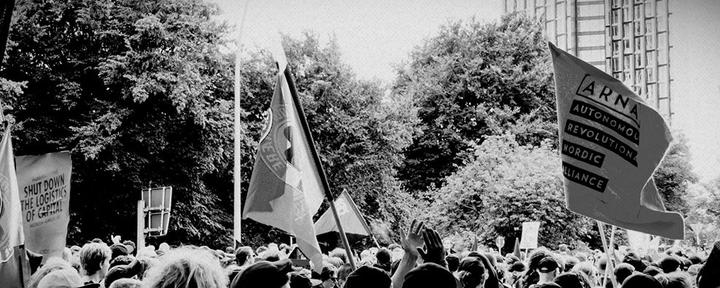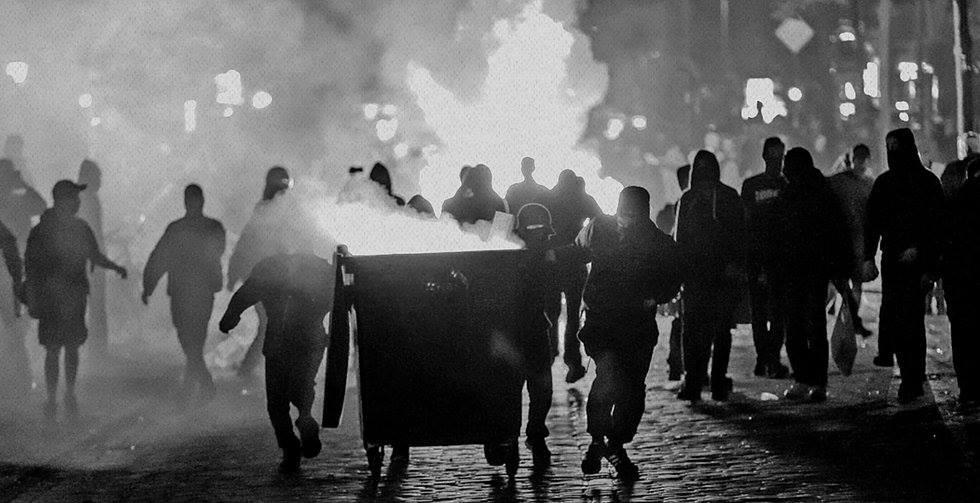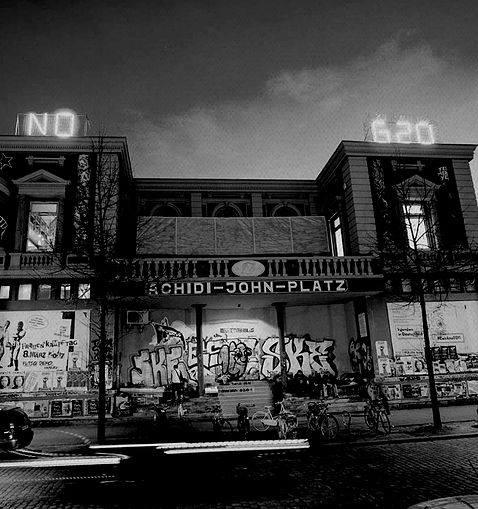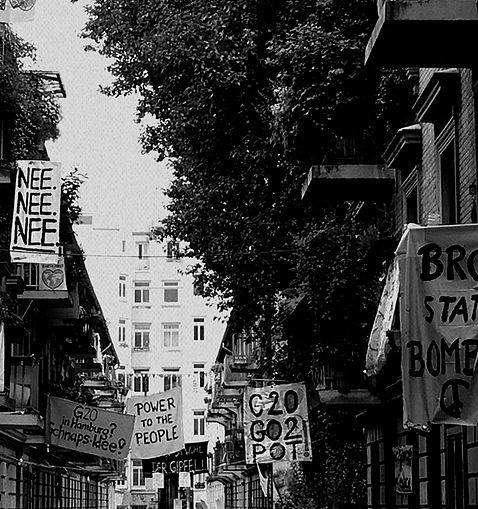

We write this evaluation of the events surrounding before, during and after G20 in Hamburg 2017 as an international alliance of autonomous, revolutionary and Nordic groups (ARNA - link: infoarna.org) who took part in the process that made the rebellious days in Hamburg in July possible. For us G20 was always a process of organizing, networking, discussing and energizing our movements; a process of making new affinities locally and internationally and break the theoretical, political and social isolation in which we have been for some years. As an alliance we took part in the planning, preparation and execution of actions, demos, blocks as well as arranging a bus convoy to Hamburg.
All of Hamburg hates G20 - All of Hamburg hates the police
We are impressed by the support of locals and the widespread hate of G20 in Hamburg; from street to street and shop to shop you could see that the G20 villains are not welcome. Even more impressive was the local movement and infrastructure that could organize gatherings, parties and international meetings leading up to G20 and sleeping places, info points, moving food trucks, demos, legal aid, street medics and much more, even after all the police repression before and during the summit days. Because of the repression there were not one or two mass camps, which ironically meant that the police couldn't really control us, and we didn't have to use most of our time defending the camp site which has been an experience of international gatherings in the past. However, the loss of a single central campsite also hindered some of our plans of socializing and organizing internationally and it made our Nordic structure only partially successful as we could not gather en masse.
The effectiveness of dispersion also showed during the whole Friday day when road blockades, the harbor blockades, burning barricades, sabotage and other actions synchronized to mess up the dream of a peaceful and glowing G20 conference for the rich and powerful. The police violence before and during the protests and the illegal repression against the legal camp sites showed that self-defense against police oppression is the only way to go for us. What it also showed is that we need to be cleverer than the cleverest police: we need to be proactive, mobile, unpredictable and act collectively in situations like those in Hamburg.

Collective efforts and the show of strength
We all know that without the riots the peaceful demos and actions would have been as a fly's hum in the distance. Riots were the element that will be remembered and which were successful in breaching the media story about the summit. It is an essential aspect of our struggle and a central but not mandatory aspect of our power. Of course, without the peaceful events and tens of thousands participating in the local struggle against G20, the insurrectional moments would have been nothing more than posing.
As a movement we should be critical about the risk of rioting becoming only an aesthetic fetish where the tactic is reproduced in a visionless trap of reproducing identity. Our goal is to create connections, affinity and to change the social relationships so that insurrection becomes possible on societal level. It doesn't necessarily mean bigger riots or an armed civil war, it means the transformation of the lives of the involved and the formation of new relationships. It is a revolutionary process where focus lies in the doubtlessly fragmented and incomplete resistance growing against the normal, against police and the inequality we face daily.
During the Friday day and night of actions we saw that in riotous situations anger is diffused and not all participants have clear political goals or the experience: some threw projectiles from far behind the front line hurting others and we saw multiple times people running aimlessly away from police who were far away, this caused dangerous situations where affinity groups suddenly found themselves alone without enough comrades to even defend their position. Also, some situations could have been better at being inclusive rather than focused on throwing lone bottles against far-away police lines.
The destruction of cheap cars and looting of a few small shops in Schanzen gave media and police an easy weapon against us; a weapon for repression that we all have witnessed from Cairo to Stockholm and from Berkeley to Copenhagen: social and political isolation through an attempt by media and politicians to isolate the rebellious from the more reformist ones and divide us. Nevertheless, even if some of the rioting might have alienated some of our supporters and possible future allies, we should never attack the people risking their lives on the streets. This doesn't mean we shouldn't be self-critical, but at the same time we should show our solidarity with all the angry people around the world who dream about a life and planet based on mutual aid, equality and freedom.

We believe that the police wanted us to remain in the areas of Schanzen, St. Pauli and Altona to limit us to our own neighborhoods. In this they succeeded. Staying there was a tactical error, partly caused by a lack of communication and gathering points during Friday and Saturday night. Twitter is not enough for our aims, and Twitter feeds largely in German is definitely not enough for international actions. Sure, there were call outs, discussions and examples during the year of attacking the symbols of power, wealth and G20, but in the end it was left mostly as an individual choice about where to go, not a collective effort to go together. With that said, what happened in Schanzen during Friday night was a show of strength from us, we took control of the neighborhood and left the 20 000+ police, who just a day before had beaten and gased the Welcome to Hell demonstration, to tear gas themselves while people broke into the Hamburger Sparkasse, a bank next to Rote Flora, trying to burn it from the inside.
We believe in different methods and tactics and we are impressed by how diversity of tactics worked during the days in Hamburg on the streets, however, that didn't continue afterwards when some wanted to collect cheap liberal and conservative votes. The absurd point is of course that reformists are only asked about their opinions as a result of militant struggle. For us as a revolutionary alliance it's clear that party politics, reformism or sole representation in the media is never going to be a solution for our struggle. We don't want to preserve the normality of class society or pacify the insurgent will, we want to escalate the struggles we are in.
Nordic mobilization to Hamburg as a political intervention
As said, for us G20 has been a process of learning and creating new affinities. We have created an open Nordic alliance where different groups from different traditions can participate on a democratic basis, we have together with …ums Ganze! organized an info tour across four countries, we have held numerous meetings, info-events and evaluations in over ten cities, participated in pod-casts and other media, gone to countless meetings in different countries and mobilized to Hamburg for almost a whole year.
Our mobilization proves the point that event protests don't have to be separate from local mobilization, we all have experiences of young people coming and learning in the streets of Hamburg and gaining a practical understanding of our struggle. We have created new relationships and alliances that have given us a practical, everyday boost in our movements. In our call we said that we wanted to go to Hamburg in order to energize our movements and we have succeeded better than we hoped for.
No doubt we would have wanted to be earlier in Hamburg then late Thursday evening and we knew that we would be stopped at the German border for some time. However, we feel the collective trip was what made a political intervention possible: it is through this that we were able to organize in the streets and do something together with many different subjectivities. It was very hard for us to go earlier as some buses had already to leave on Tuesday and we didn't actually think that the police were going to hold us at the border for five hours until the start of the Welcome to Hell demonstration. In the future we have to consider if we should attempt similar convoys or not or at least be prepared for longer stops. It is clear to us that our bus convoy gave us our structure: many of the comrades who went there on their own were dispersed around the city and did not manage the same level of political intervention as we did. We also felt incredibly energized together in our blocks, during the countless calls of "Arna, Arna!" in the streets and during the scene of 300 people rushing out from the buses for a smoke at the first rest stop in Denmark. Going together is for us a collective political experience that we believe we could not succeeded in doing otherwise.
Tactical and theoretical experimentation
For us G20 was also a trial of new tactics and theory. Some of the groups involved in ARNA were involved in the

Shut Down the Logistics of Capital-action where Hamburg harbor was blocked. The blockade was, even if it hurts to say it, probably more symbolic than economic in its nature. At the same time the pile-up of lorries, which extended several kilometers, and the shutting down of the part of the harbor we were in, was authentic. But for us it was never about just one action, it was about contributing to the discussion of logistics as one of the weak and central points of capitalism, and testing how we can attack it in different ways in Hamburg and beyond. On Friday morning we were a bit fewer than we hoped, but we managed to stop the truck and train transports to one of the biggest harbors of Europe for as long as we wanted. Police attempts of surrounding us and preventively closing some streets just contributed to the blockades and made some companies issue Friday as remote work day long before the action. The Friday morning worked, not solely because of the great plan, but because of the great number of actions that happened around the city at the same time. For many of us it feels like attacking logistics in different ways from blockades and strikes to militant actions is the way to go in the future. It's a push of broadening and uniting our struggles, tactics and capabilities from the predictable A to B demos to more innovative ways of shutting down capitalism.
In closing, we managed to create a powerful Nordic mobilization, create new relationships and affinities between people, work on an international and internationalist level and be a part of a massive and successful mobilization that made clear that G20 was definitively not welcome in Hamburg. We want to thank everyone who made this possible. We will take our experiences with us to the future in our struggle for a world without states and classes.
August 2017, Autonomous Revolutionary Nordic Alliance
Autonomous Revolutionary Nordic Alliance
Länk: https://infoarna.org